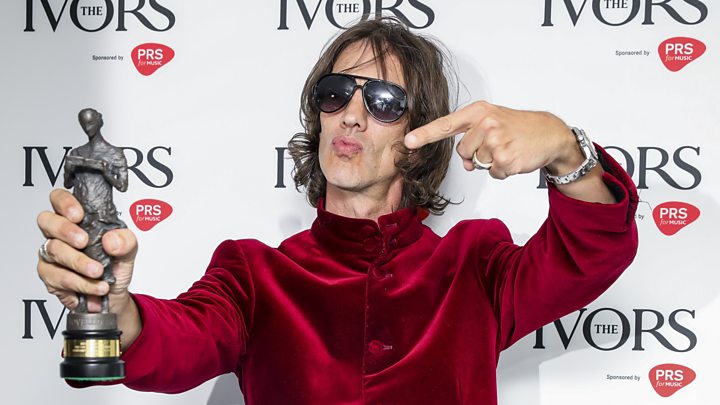One of rock music’s most famous injustices has finally been resolved.
For the last 22 years, The Verve haven’t made a penny from Bitter Sweet Symphony, after forfeiting the royalties to The Rolling Stones.
The song was embroiled in a legal battle shortly after its release, as it samples an orchestral version of The Stones’ song The Last Time.
As a result, writer Richard Ashcroft had to sign over his rights to Mick Jagger and Keith Richards – until now.
Speaking as he received a lifetime achievement prize at the Ivor Novello Awards, Ashcroft announced: “As of last month, Mick Jagger and Keith Richards signed over all their publishing for Bitter Sweet Symphony, which was a truly kind and magnanimous thing for them to do.”
As a result, all future royalties for the song will now go to Ashcroft.
The singer acknowledged that it was the Rolling Stones’ late manager, Allen Klein, who had been responsible for the situation, rather than the musicians themselves.
“I never had a personal beef with the Stones,” he told the BBC. “They’ve always have been the greatest rock and roll band in the world.”
He went on to thank Jagger and Richards for acknowledging he was responsible “for this [expletive] masterpiece”.
According to Rolling Stone magazine, the royalty dispute arose in 1997 when The Verve sought permission to sample a short, staccato string sequence from the symphonic version of The Last Time, recorded in 1965 by the Andrew Oldham Orchestra.
The Stones agreed to license a five-note segment in exchange for 50 percent of the royalties, but Klein claimed the Verve voided the agreement by using a larger portion of the song.
ABKCO Records, Klein’s holding company, filed a plagiarism case, after which The Verve relinquished all their royalties and publishing rights to ABKCO, and the song credit reverted to Jagger and Richards.
The situation rankled The Verve for years.
“We were told it was going to be a 50/50 split,” recalled bassist Simon Jones.
“Then they saw how well the record was doing they rung up and said, ‘We want 100 percent or take it out of the shops, you don’t have much choice.'”
The bitterest pill came when the song was nominated for a best song Grammy – with Jagger and Richards’ names on the ballot.
Asked in 1999 if he believed The Verve had been treated fairly, the Stones’ guitarist replied: “I’m out of whack here, this is serious lawyer [stuff].”
However, he added: “If the Verve can write a better song, they can keep the money.”
Life-affirming
Ashcroft told the BBC that the dispute came to an end following negotiations with Klein’s son, and the Rolling Stones new manager Joyce Smyth.
“It’s been a fantastic development,” he said. “It’s life-affirming in a way.”
One unexpected benefit is that the singer can once again enjoy international football.
“They play it [Bitter Sweet Symphony] before England play. So I can sit back and watch England… and finally just enjoy the moment.”
In a statement, The Rolling Stones acknowledged that Ashcroft had been denied the rights to “one of his most iconic songs, including the lyrical content” for more than two decades.
“Of course there was a huge financial cost but any songwriter will know that there is a huge emotional price greater than the money in having to surrender the composition of one of your own songs. Richard has endured that loss for many years.”
Bitter Sweet Symphony has sold 1,276,209 copies in the UK, according to the Official Charts Company, including 70,593 this year.
- Protest music dominates songwriting awards
- Ryan Tedder slams ‘ludicrous’ copyright cases
Ashcroft picked up the outstanding contribution prize at Thursday’s Ivor Novello Awards, which recognise achievement in songwriting.
Other winners included Deep Purple, Dido and Mariah Carey, who won the special international award.
“I rarely get acknowledged for my songwriting, which is the core of who I am,” said the diva in a video message – due to the fact she’s performing at an AIDS gala in Cannes on Thursday evening.
“It’s a beautiful thing to feel appreciated for the music I’ve been making for my entire career.”
Carey has written or co-written 17 US number one singles, including Vision of Love, Hero, We Belong Together and Fantasy (her 18th number one, I’ll Be There, is a cover of a Jackson 5 song).
Her festive hit All I Want For Christmas Is You has become a modern-day standard, and was streamed a staggering 38 million times in the UK last year alone.
Grime pioneer Wiley received the “inspiration” prize and instantly handed it over to his father, the reggae musician Richard Cowie.
“It’s because of him that I do it,” said the star. “I want to big up my dad.”
Socially-conscious punk band Idles won album of the year, while The 1975 took home two prizes – songwriters of the year and best contemporary song for the state-of-the-nation pop anthem Love It If We Made It.
Organisers hailed the “brilliantly diverse” range of songwriting talent in the UK, noting that 70% of this year’s nominees were being recognised for the first time.
Full list of winners and nominees
Songwriters of the year – The 1975
Special international award – Mariah Carey
Inspiration award – Wiley
Best song musically and lyrically
- Nica Libres At Dusk – Ben Howard (winner)
- Four Out Of Five – Arctic Monkeys
- Nina Cried Power – Hozier
Best contemporary song
- Love It If We Made It – The 1975 (winner)
- Black Rose – Ghetts ft Kojey Radical
- Blue Lights – Jorja Smith
PRS For Music most performed work
- These Days – Rudimental ft Jess Glynne, Macklemore and Dan Caplen (winner)
- Shotgun – George Ezra
- Breathe – Jax Jones ft Ina Wroldsen
Best album
- Joy As An Act of Resistance – Idles (winner)
- Cocoa Sugar – Young Fathers
- I’m All Ears – Let’s Eat Grandma
Best original film score
- Phantom Thread – Jonny Greenwood (winner)
- American Animals – Anne Nikitin
- Spider-Man: Into the Spider-Verse – Daniel Pemberton
Best television soundtrack
- Requiem – Natasha Khan and Dominik Scherrer (winner)
- Flowers (Series 2) – Arthur Sharpe
- Happy New Year, Colin Burstead – Clint Mansell
Best original video game score
- Sea of Thieves – Robin Beanland (winner)
- Assassin’s Creed Odyssey – Joe Henson and Alexis Smith (The Flight) and Michael Georgiades
- Q.U.B.E. 2 – David Housden
International achievement – Deep Purple
Outstanding song collection – Dido
Outstanding contribution – Richard Ashcroft
Ivors Jazz Award – Django Bates
Follow us on Facebook, on Twitter @BBCNewsEnts, or on Instagram at bbcnewsents. If you have a story suggestion email [email protected].
- Ivor Novello Awards
- Mariah Carey
- The 1975
- The Rolling Stones
Source: Read Full Article

